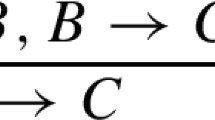Abstract
A detailed exposition of one of the author’s old results concerning the relationship between the propositional logic of realizability and the logic of Medvedev is given. The characteristic formulas introduced by Yankov play a decisive role in the proof. Along the way, a brief overview of Yankov’s contribution to the study of propositional logic of realizability is given.
Access this chapter
Tax calculation will be finalised at checkout
Purchases are for personal use only
Similar content being viewed by others
References
Citkin, A. I. (1978). On structurally complete superintuitionistic logics (Russian). Doklady Akademii Nauk SSSR, 241, 40–43. Translation Soviet Mathematics Doklady, 19, 816–819.
Heyting, A. (1930). Die formalen Regeln der intuitionistischen Logik. Sitzungsberichte der Preussischen Akademie der Wissenschaften. Physikalisch-mathematische Klasse, 42–52.
Jankov, V. A. (1963a). On realizable formulas of propositional logic (Russian). Doklady Akademii Nauk SSSR, 151, 1035–1037. Translation Soviet Mathematics Doklady, 4, 1146–1148.
Jankov, V. A. (1963b) On the connection between deducibility in the intuitionistic propositional calculus and finite implicative structures (Russian). Doklady Akademii Nauk SSSR, 151, 1293–1294. Translation Soviet Mathematics Doklady, 4, 1203–1204.
Jankov, V. A. (1969). Conjunctively indecomposable formulas in propositional calculi (Russian). Izvestiya Akademii Nauk SSSR. Seriya Matematicheskaya, 33, 18–38. Translation Mathematics of the USSR-Izvestiya, 3, 17–35.
Jaśkowski, S. (1936). Recherches sur le système de la logique intuitioniste. Actes du Congrès International de Philosophie Scientifique, VI, Philosophie des mathématique. Actualités scientifique et industrielle, 393, 58–61. Translation Studia Logica, 34, 117–120.
Kleene, S. C. (1945). On the interpretation of intuitionistic number theory. Journal of Symbolic Logic, 10, 109–124.
Kolmogorov, A. N. (1925). On the tertium non datur principle (Russian). Matematicheskii sbornik, 32, 646–667. Translation (van Heijenoort 1967), pp. 414–437.
Kolmogorov, A. N. (1932). Zur Deutung der intuitionistischen Logik. Mathematische Zeitschrift, 35, 58–65.
Maksimova, L. L., Skvortsov, D. P., & Shekhtman, V. B. (1979). The impossibility of a finite axiomatization of Medvedev’s logic of finitary problems (Russian). Doklady Akademii Nauk SSSR, 245, 1051–1054. Translation Soviet Mathematics Doklady, 20, 394–398.
Medvedev, Y. T. (1962). Finite problems (Russian). Doklady Akademii Nauk SSSR, 142, 1015–1018. Translation Soviet Mathematics Doklady, 3, 227–230.
Medvedev, Y. T. (1966). Interpretation of logical formulae by means of finite problems (Russian). Doklady Akademii Nauk SSSR, 169, 20–23. Translation Soviet Mathematics Doklady, 7, 857–860.
Nelson, D. (1947). Recursive functions and intuitionistic number theory. Transactions of the American Mathematical Society, 61, 307–368.
Plisko, V. (1973). On realizable predicate formulae (Russian). Doklady Akademii Nauk SSSR, 212, 553–556. Translation Soviet Mathematics Doklady, 14, 1420–1424.
Plisko, V. (2009). A survey of propositional realizability logic. The Bulletin of Symbolic Logic, 15, 1–42.
Rasiowa, H., & Sikorski, R. (1963). The mathematics of metamathematics. Warszawa: Państwowe Wydawnictwo Naukowe.
Rose, G. F. (1953). Propositional calculus and realizability. Transactions of the American Mathematical Society, 75, 1–19.
Skvortsov, D. P. (1995). A comparison of the deductive power of realizable sentential formulas (Russian). Logicheskie issledovania (Logical Investigations), 3, 38–52.
van Heijenoort, J. (Ed.). (1967). From Frege to Gödel: A source book in mathematical logic, 1879–1931. Cambridge: Harvard University Press.
Acknowledgements
The reported study was funded by RFBR, project number 20-01-00670.
Author information
Authors and Affiliations
Corresponding author
Editor information
Editors and Affiliations
Rights and permissions
Copyright information
© 2022 Springer Nature Switzerland AG
About this chapter
Cite this chapter
Plisko, V. (2022). An Application of the Yankov Characteristic Formulas. In: Citkin, A., Vandoulakis, I.M. (eds) V.A. Yankov on Non-Classical Logics, History and Philosophy of Mathematics. Outstanding Contributions to Logic, vol 24. Springer, Cham. https://doi.org/10.1007/978-3-031-06843-0_8
Download citation
DOI: https://doi.org/10.1007/978-3-031-06843-0_8
Published:
Publisher Name: Springer, Cham
Print ISBN: 978-3-031-06842-3
Online ISBN: 978-3-031-06843-0
eBook Packages: Mathematics and StatisticsMathematics and Statistics (R0)




